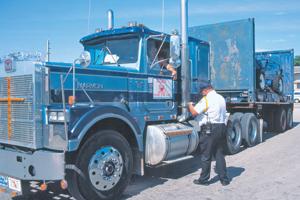Sen. Murray Blasts FMCSA for Truck Safety Inaction

By Sean McNally, Senior Reporter
This story appears in the April 30 print edition of Transport Topics. Click here to subscribe today.
WASHINGTON — The chairwoman of the Senate panel responsible for funding the Federal Motor Carrier Safety Administration criticized the agency for not doing enough to keep unsafe trucks and drivers off U.S. highways.
 “Let me be clear. Our nation’s economy depends on a safe, efficient and well-capitalized trucking industry,” Sen. Patty Murray (D-Wash.) said during an April 19 hearing of the Senate Appropriations Committee’s panel overseeing the Department of Transportation.
“Let me be clear. Our nation’s economy depends on a safe, efficient and well-capitalized trucking industry,” Sen. Patty Murray (D-Wash.) said during an April 19 hearing of the Senate Appropriations Committee’s panel overseeing the Department of Transportation.
“But just as we need to take a more aggressive posture in getting people to buckle up their seat belts and drink and drive responsibly, we also need a truck-safety agency that will find the problems with rogue trucking companies before fatalities occur, not after.”
But FMCSA Administrator John Hill said the agency was doing more than ever before to improve truck safety, and those efforts were garnering results.
“The good news is that for the past two years, we as a nation achieved the lowest truck-fatality rate in 30 years,” Hill said. “This means that despite trucks’ traveling more miles — over 7% [more] in the past five years — the proportion of fatalities is down. However, we know that despite these gains, we are not seeing a drop in overall fatalities.”
Hill said FMCSA and state partners conducted 15,000 compliance reviews in 2006 and “took more than 4,000 enforcement actions.”
Among Murray’s criticisms of FMCSA was a failure to act on concerns raised about its compliance review process by the National Transportation Safety Board.
She cited recent reports about a truck-involved crash near Washington, D.C., where the carrier had been identified as at risk and had recently been inspected by FMCSA. She questioned how the agency could miss several violations detected after the crash, including the use of a disqualified driver.
“I suspect the answer to those questions also explains why the National Transportation Safety Board has determined that FMCSA’s compliance review process is, in their words, ‘ineffective,’ ” she said. “I also suspect that it explains why the NTSB has determined that the FMCSA response to its recommendations in this area have been ‘unacceptable.’ ”
Hill said in the specific case, there was “a deficiency in the process.”
Later, in response to a question from Murray, NTSB Chairman Mark Rosenker said that he believed FMCSA was too dependent on safety information provided by trucking companies themselves. However, he said the issue was complex.
“This is a very challenging issue, given the number of people that are at FMCSA that do this kind of work,” Rosenker said. “It is extremely, extremely difficult to find all of the bad actors that are on the road roads today, and there needs to be, perhaps, a total overhaul of the system, so that, in fact, we do a better job of beginning to understand where the bad actors are and how we can enforce actions to get them off the road.”
Murray also questioned trucking’s out-of-service rates, noting that FMCSA claims a 21% out-of-service rate at its roadside inspections.
“That means, when federal and state officials inspect trucks and truck drivers on the road today . . . more than one out of five are in such deficient condition that they are ordered off the road immediately,” she said. “Can you imagine how we would react if it was found that one out of every five passenger jets was routinely unfit to fly?”
Hill said the high rate did not paint an accurate picture.
“These inspections typically are targeted inspections. In other words, we have developed information tools to identify the worst carriers coming through, so that when they inspect [a truck], they’re typically not inspecting a random sample; they’re inspecting the worst carriers coming through,” he said.
After the hearing, Hill told Transport Topics he thought the questions should make the industry more aware of safety.
“I hope that motor carriers throughout the country are taking notice of the kind of scrutiny that’s been given to oversight, and it’s beholden on them to exercise tremendous oversight of their safety practices,” he said.

